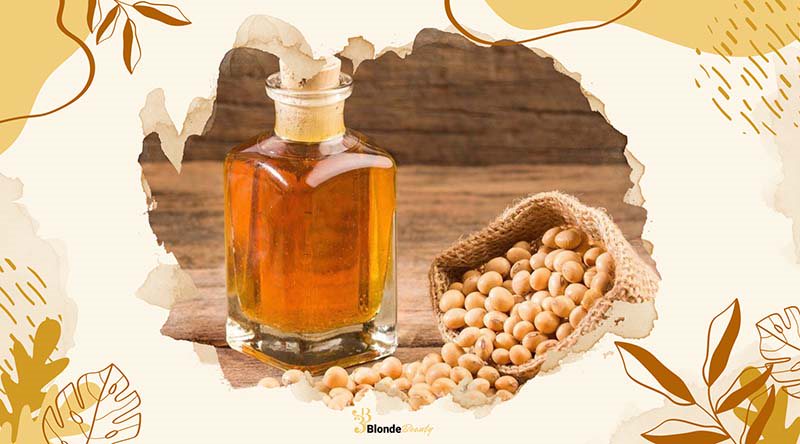Soybean oil has long been a key ingredient in various beauty and personal care products, particularly in hair care industry.
But what exactly are the soybean oil benefits for hair, and is it worth incorporating this oil into your regular hair care routine?
Here’s a detailed look at what soybean oil offers for hair health and whether it should become a staple in your hair care arsenal.
Is Soybean Oil Good for Hair?
Soybean oil is highly beneficial for hair growth thanks to its rich composition of nutrients. It contains essential fatty acids such as omega-3 and omega-6, along with vitamin E, which are crucial for promoting healthy hair growth.
These nutrients help to nourish the hair follicles and scalp, enhance blood circulation, and supply the essential elements needed for strong, shiny hair. Moreover, the fatty acids in soybean oil strengthen the hair fibers, minimize breakage, and improve the overall health of the hair.
Note: Regularly massaging soybean oil into your scalp can improve absorption and maximize its benefits for your hair.

Benefits of Soybean Oil for Hair
Here are several health benefits of using soybean oil for hair growth, as highlighted by experts:
- Nourishes the Hair: The nutritional components of soybean oil provide essential nourishment to both the scalp and hair follicles, promoting healthier hair growth.
- Enhances Hair Softness and Smoothness: Soybean oil helps smooth hair cuticles, which can soften curls and tame frizz without straightening the hair. When added to conditioners, serums, or hair treatments, it imparts a shinier, softer texture to the hair.
- Deep Conditioning: Rich in proteins and oils, soybean oil acts as an effective moisturizer and conditioner for the hair. It penetrates deep into the hair fibers, particularly at the roots, helping to manage split ends and alleviate dry scalp issues.
- Improves Hair Texture: Frequently used in various hair care products, soybean oil enhances the overall hair texture by providing moisture and nourishment. Its ability to quickly penetrate the scalp allows it to effectively lubricate hair strands, enhancing their look and feel.
- Anti-inflammatory Properties: Soybean oil is abundant in vitamin E, known for its anti-inflammatory effects. Regular use in hair care routines can help address scalp conditions such as dandruff and reduce overall scalp inflammation, as noted in research published in the HHS Public Access Manuscript Journal.

Note: For best results, consider using pure soybean oil as a pre-shampoo treatment or as an overnight hair mask.
How to Use Soybean Hair Oils
Here’s a simplified guide on how to use soybean oil for different hair treatments:
For Scalp Massage:
- Combine 1 tablespoon of soybean oil with 1 tablespoon of castor oil.
- Add 4 to 5 drops of a growth-promoting essential oil, such as lavender, peppermint, or rosemary, to the mixture.
- Massage the oil blend thoroughly into your scalp.
- Follow up by washing and conditioning your hair as usual.

For Deep Conditioning:
- Warm up 1/3 cup of soybean oil.
- Using a brush, apply the oil evenly across your hair and scalp.
- Cover your hair with a shower cap to lock in the moisture.
- Leave the oil in your hair for 30 minutes to an hour.
- Rinse your hair thoroughly and continue with your regular shampooing, conditioning, and styling routine.

Note: Consistent use of soybean oil in these treatments can lead to noticeable improvements in hair health and growth.
Are There Any Side Effects of Soybean Oil for Hair?
While soybean oil is generally safe for most people, there are some potential side effects to be aware of:
- Allergic Reactions:
People with soy allergies might have allergic reactions when applying soybean oil to their hair. - Greasy or Heavy Sensation:
Overusing soybean oil can result in a greasy or heavy feel on both the hair and scalp. - Clogged Pores:
For those with sensitive skin, soybean oil could potentially clog pores on the scalp, causing acne or irritation.
Note: Always conduct a patch test before using soybean oil extensively to ensure you do not have an adverse reaction. Use it in moderation to avoid buildup and maintain a balanced hair care routine.
Conclusion
Soybean oil is excellent for hair care, offering moisturizing properties, frizz reduction, and enhanced shine, prompting the question, “Is soybean oil good for hair?” Its benefits make it a useful addition to your hair care routine.
Additionally, its versatility in cooking due to a high smoke point and neutral taste makes it a practical choice in the kitchen.
However, it’s high in omega-6 fats, so it should be used sparingly and complemented with other healthy fats like fatty fish, nuts, and seeds to maintain a balanced diet.
Don’t forget to check out more blogs from Blonde Beauty for additional tips and insights on achieving your best hair ever.

Laureate Professor Clare Collins
Professor Clare Collins is a leading expert in nutrition and dietetics at the School of Health Sciences, part of the College of Health, Medicine and Wellbeing. Her work is changing the way we think about food and health. She grew up as one of nine children and was the first in her family to finish high school and go to college. This background gave her a strong work ethic and a deep appreciation for seizing opportunities.
As the Director of the Hunter Medical Research Institute’s Food and Nutrition Program and a recipient of three NHMRC Research Fellowships, Professor Collins is making a big difference in public health. She focuses on helping people who are often overlooked, using new technologies like apps and online programs to improve their nutrition and reduce the risk of chronic diseases.
Professor Collins is well-respected and has been recognized as a Fellow in four major health and science organizations. She leads a diverse team of experts, including dietitians, computer scientists, and engineers, working together on global health projects.
Her achievements are impressive. She has received over $29 million in research funding, published more than 450 papers, and helped 35 PhD and Master’s students complete their degrees. She’s also active in sharing her knowledge with the public. She has developed tools like the Australian Eating Survey and the Healthy Eating Quiz, and she often appears in the media to talk about nutrition.
PUBLISHED ARTICLES
- Collins, C. (2019). “The Effect of a Pilot Dietary Intervention on Pain Outcomes in Patients Attending a Tertiary Pain Service.”
- Collins, C. (2022). “Variation in cardiovascular disease risk factors among older adults.”
- Collins, C. (2022). “Evaluation of an online intervention for improving stroke survivors’ health-related quality of life: A randomised controlled trial.”
These articles show Professor Collins’s commitment to understanding how better nutrition can improve health. Her work is important for researchers, doctors, and anyone interested in healthy living.
